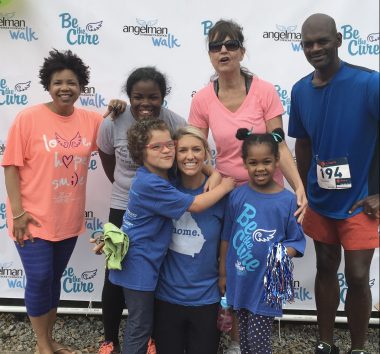Treating Every Day Like Angelman Awareness Day
Written by |

International Angelman Day on Feb. 15 is a time to tell the world about Angelman syndrome. But for me, raising awareness is an everyday event.
My reasons to support AS awareness are simple: It leads to better and more supportive care for those with AS, more research and funding, and more money for programs and clinics that provide resources for families like mine and my 11-year-old Angel, Juliana.
Not that kind of Angel
Yes, Angelman awareness is a good thing. When I approach friends and family about supporting our efforts for things like the annual ASF Walk, they are aware of some of the challenges we face and are happy to support us. But when you’re living with Angelman syndrome every day, you forget that this disorder is rare, and many don’t know about it.

Juliana, front left, joins her teacher and support staff at the 2019 ASF Walk. (Photo by Sabrina L. Johnson)
With Angelman syndrome affecting about 1 out of 15,000 people, you don’t see it often, so that also makes it new to most. However, thanks to organizations like the Angelman Syndrome Foundation, the word is spreading. When International Angelman Day started in 2013, more than 1,000 messages about AS were exchanged on Facebook. I can’t imagine what those numbers are like today.
The idea of a day dedicated to telling others about AS is a beautiful thing. This year, my husband will be joining the effort on his Facebook page. However, for an introvert like me, sending messages on social media isn’t so fun.
I know talking to people is such an old-fashioned way of doing things, but that’s how I spread the love about AS. Taking a creative approach never fails, so I think of ways to plant those little seeds all year long.
Following are a few tactics I enjoy utilizing most:
Each one, reach one
As a teacher, one of my favorite stories to read with my class is “Big Brother” by Henry Becker. It’s about a young boy coming to terms with his brother’s special needs. I use the opportunity to tell them about Juliana and introduce them to AS. I explain what it means to be nonverbal. This alone is an eye-opener for a lot of fifth graders.
Another way I expose others to AS is through Juliana’s greeting card. The card stays on her backpack, and we give it to new caregivers who have never heard of AS. Her greeting card outlines Juliana‘s likes and dislikes as well as general characteristics about people with Angelman syndrome.
Writing means sharing
Finally, writing about AS has been the expressive medium that most excites me. Back in 2013, I began writing about my life with AS through my personal blog, and I received comments and feedback. One of my favorite messages was from a college student who was reading my blog. His mom had sent him the link.
When this student reached out to me via Facebook, there were no words for my surprise. He wanted to let me know how much he enjoyed reading the stories about Juliana. He is not alone. I cannot begin to know the number of people I have exposed to AS just by writing stories about our life with Angelman syndrome. I sure hope it’s a lot.
Writing has also opened doors for me to talk about our special needs journey with therapists and similar groups. Public speaking is not a favorite activity of mine, but I’m happy to talk about AS anytime I am given the chance.
Awareness about Angelman syndrome is so important. We’re changing the lives of our loved ones by simply spreading information. It doesn’t get much easier than that, and I’m happy to join countless organizations and families this year to do my part.
Note: Angelman Syndrome News is strictly a news and information website about the disease. It does not provide medical advice, diagnosis, or treatment. This content is not intended to be a substitute for professional medical advice, diagnosis, or treatment. Always seek the advice of your physician or other qualified health provider with any questions you may have regarding a medical condition. Never disregard professional medical advice or delay in seeking it because of something you have read on this website. The opinions expressed in this column are not those of Angelman Syndrome News or its parent company, Bionews, and are intended to spark discussion about issues pertaining to Angelman syndrome.






Leave a comment
Fill in the required fields to post. Your email address will not be published.